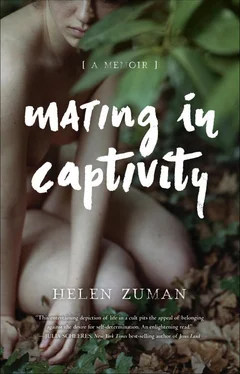Mostly I inquired in private, denying ammo to family and friends threatened by the revolution’s critique of them. As for ex-Zendiks turned critics— they were lying whiners, dodging blame for their failures. Arol’s voice in my head condemned them: “Get a life!” she’d say. “We’re not perfect. Who is? But at least we’re trying. Throw in or move on.”
I had to shun such negativity, lest it infect me.
Thus the Zendik story sealed itself.
But not completely.
I met Sea through the blog I’d started in April 2005. She credited her few years at Zendik, in the late seventies and early eighties, with rousing sleeping gifts and blowing her mind. Yet she’d chosen, without regret, to settle elsewhere. In her first message to me, she said she knew the ache of leaving the Farm and treasured my giving it words. She assured me I could thrive in the outside world.
She slipped through the seal.
With her support, I raised my inner voice. Through October and November, I wrote and wrote, spreeing on thought crime (and bashing myself for it) as I spun strands of a new story:
I wished to live among equals, with reverence for each being’s gifts and free circulation of feedback; I would not serve a hierarchy that lionized some, belittled many, and throttled dissent.
I wished to practice self-rule, based in self-trust. I cringed in rage, recalling all the times I’d sniveled and groveled in the face of accusation. Sure, I might have fucked up. But that didn’t justify ritual humiliation or conviction in a puppet court deaf to my truth. Where was the compassion, the curiosity, that could have unmasked the plea beneath the trespass? Where was my care for myself? Why had I surrendered power to decide?
I wished to shed the weight of all-my-fault, the stain of cowardice. Maybe Cayta’s judgment that I’d craved sexual assault had been neither true nor a move to empower me. Maybe I’d feared Arol because she’d roared, above the law of cause and effect; maybe I’d taken blame I hadn’t earned because it beat risking soul death.
I wished never to sell again. I’d hated asserting my worth through numbers; competing with other sellers (while cursing my competitiveness); dodging them when I was bombing; waking in the morning, still exhausted, to the dread of getting blasted. Stripped of other ways to soar, I’d embraced running the money gauntlet as my highest art form.
I wished to tell my story as my story, not a footnote to Zendik’s, in words dense and juicy as ripe fruit. I saw that my prose had grown more succulent, as I’d haltingly allowed all my flavors—bitter, tart, sweet—onto the page. I admitted that I’d often admired Zendik art only because admiration was required. Now I could freely seek art that moved me—and channel that which moved through me.
I wished to join all who were willing in building a beautiful world. As a Zendik, I’d believed our way of life so enticing that its popularity would one day explode. Yet in the year since I’d left, the Farm’s head count had dropped to twenty-four. What did that mean for Ecolibrium? How would it grow, nursed by so few? Was Zendik pushing something the world didn’t want? Maybe every act of beauty fostered beauty, no matter the source. Maybe Wulf, describing Ecolibrium, had drawn from a well I, too, could draw from, pouring what rang true into my own resurrection song. One thing I knew: in my Eden, we’d receive gifts and good wishes when we chose to move on.
I wished to claim my life as my own, with Zendik a stage in my growth. Wulf, urging flight from the Deathculture, had said, “Forget the old dream; save the dreamer.” Had Zendik become the “old dream”? I saw I’d begun losing heart long before I’d left; had I wanted to flee but, fearing soul death, needed a shove? Could I be neither traitor nor failure, but creature achieving new form?
I wished to belong without condition. Once I’d lost utility, Zendik had dropped me. How could a human settle, and flourish, in a mesh full of holes? How could such a mesh be home? Why call the Farm, knowing no one there cared to hear my stories?
I wished to mate for life. I couldn’t do that at Zendik, where, I admitted, I’d dropped men under duress. Maybe I’d marry after all; maybe marriage, when it lasted, strengthened the mesh.
Last—and most—I wished to go on loving all of those I loved. The Zendiks had pushed me from their ring to serve the revolution. But what if human ties were sacred and the world we yearned for hung on human ties? I would not snip links to family and friends for the prize of rejoining the ring.
But these epiphanies weren’t enough. The threads I spun and pulled across my portal to the Farm formed a barrier no stronger than the hundred strands of fishing line I’d once snapped in one thrust.
I needed a weft for my warp, if it was to hold.
When Leah appeared at my door at 9:00 p.m. on December 1, she looked smaller and more vulnerable than the power seller I remembered. Her broad smile and warm hug held none of the judgment I’d half-expected.
I’d believed, since I’d left the Farm, that Leah’s success on the street signified a faith far stronger than mine. So I’d been shocked, in April 2005, to see she’d vanished from the People section of the Zendik website. Surely, I told myself, she’d left on better terms than I had and would return before long; probably if I found her she’d shrink from the taint of my failure. But in mid-November, desperate to share my struggle with a peer, I tracked her down and made contact. It so happened she’d already scheduled a stopover in New York, on her way from San Francisco to Paris. Was she heading overseas, as I had, to mow down a fantasy? I didn’t ask. We agreed to meet, not mentioning Zendik.
She wore a purple velour–lined jean jacket just like the one she’d spent hours adorning with free-form embroidery, in the van on the road. Her stitching spilled down the sleeves and around the collar, in shimmering whorls of turquoise, rose, magenta, gold.
After greeting my mother, Leah trailed me down the stairs to the street. It was a warm night for late fall. We’d talk while walking.
As we climbed the slope to the park, my voice asked about Leah’s travel plans while my heart pounded with fear of knowing and yearning to know— would she return?
“Yes” would shove me toward trying again and warn me not to blaspheme. “Maybe” would gain me a partner in confusion.
And “no”? Did I dare hope she’d say no?
A block up Twelfth Street, yearning won out.
“Leah, I have to ask: Do you think you’ll go back?”
She stopped and turned to face me, the weight of the question pinning her to the pavement. “Can I be completely honest?”
My heart pounded harder. Maybe she, too, had fallen into thought crime.
“Of course! I wouldn’t want anything else.”
Her eyes sparked. Her spine straightened. In the glow of an overhead street lamp, the whorls on her jacket gleamed like dragon scales.
“I am never going back,” she said.
My heart slammed against my breastbone. “Really?”
“Really. Helen, we went through hell . We’re not bad people ’cause we couldn’t make it there—it’s one fucked-up place.”
Thumpthumpthump.
“Wow. You know, I just recently realized I might not go back. Which was weird, because I thought I was finally ready; I’d worked out all these fantasies. But I didn’t wanna make that phone call. I don’t now. The thing is, though, some part of me still feels like I’m fucked if I stay out.”
Leah turned and started up the block again. “When I left, I felt like shit. Like I’d fucked up the one thing that mattered. It wrecked me to think this was it.”
Читать дальше











